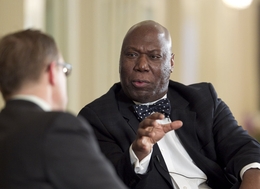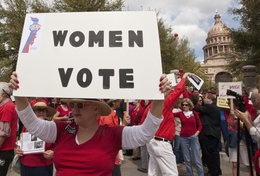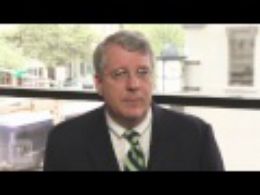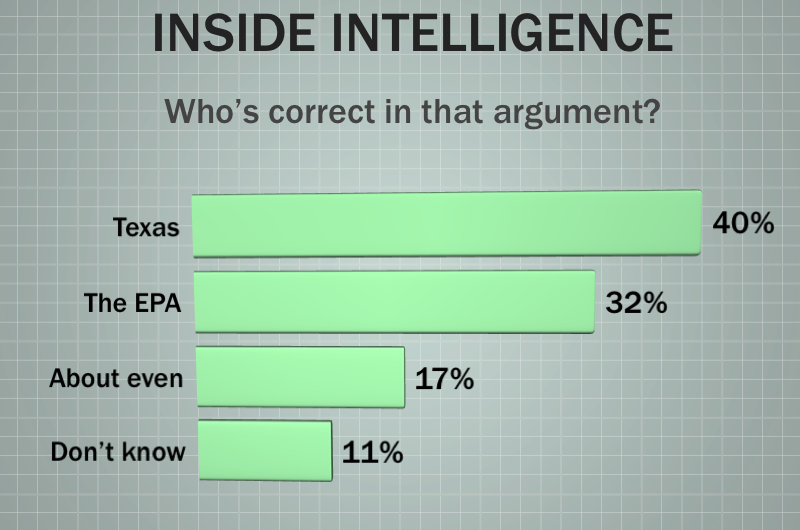The parties have filed their cleaned-up candidate lists with the Texas Secretary of State, and barring something shocking from the federal redistricting judges, it finally is starting to look like a primary season in Texas.
The primaries might turn out to be more interesting than the general election.
On the Republican side, at the federal level, there are some races that look like those marathon starts with a mob of people struggling to break out of the pack.
Even with Rick Perry off of the ballot, there are nine people seeking the Republican presidential nomination. Another nine candidates are running for U.S. Senate.
Ten Republicans are running for the Railroad Commission — six for an open and currently empty seat (Elizabeth Ames Jones resigned), and four for the spot occupied by Barry Smitherman (appointed when Michael Williams resigned).
A dozen candidates are running in the new c-36 in Southeast Texas, and there are also 12 candidates in what was Democrat Lloyd Doggett's CD-25, now redrawn to favor a Republican. Ten candidates filed in the GOP primary for Ron Paul's CD-14.
They're running in hordes out there.
Supreme Court Justice David Medina drew two primary opponents, and Justice Don Willett will face former Justice Steve Smith.
Many of the incumbent Republicans in the congressional delegation drew opponents, some of them serious ones. Ralph Hall, Joe Barton, John Culberson, Kevin Brady, Michael McCaul, Mike Conaway, Kay Granger, Mac Thornberry, Bill Flores, Randy Neugebauer, Lamar Smith, Pete Olson, Kenny Marchant, Blake Farenthold, and John Carter all drew primary opponents. Neugebauer, just to pick on someone, will face the Lubbock County GOP chairman, Chris Winn, in that primary.
Three of the four open seats in the Texas Senate — seats that are currently occupied by Republicans — will be contested in the GOP primary and a couple of other contests could be interesting if the challengers have the money to make contests of them. Two shape up immediately as knock-down-drag-out fights: The SD-9 race in Tarrant County, featuring Republican Reps. Kelly Hancock and Todd Smith; and the SD-25 race in Central Texas, where Sen. Jeff Wentworth is besieged by Elizabeth Ames Jones and Donna Campbell. The race to replace Steve Ogden has two candidates in it — Rep. Charles Schwertner and perennial candidate Ben Bius — and the contest to replace Mike Jackson has three, including Rep. Larry Taylor, who'll face a deputy sheriff and a fellow insurance agent.
The House, with a mix of open seats, rematches, grudge matches, and challenges, has more than two dozen contests of interest on the GOP side. Appropriations Chairman Jim Pitts drew three opponents. So did freshman Rep. Jim Landtroop. Rep. Chuck Hopson drew two, as did Charles "Doc" Anderson, Sid Miller, and freshly minted Republican J.M. Lozano. Five candidates will vie for Jim Jackson's seat in north Dallas County.
The Democrats have four candidates for president, and four candidates for U.S. Senate.
U.S. Rep. Ruben Hinojosa ended up with four primary challengers. Silvestre Reyes got three. The race to face Republican Francisco "Quico" Canseco has three people in it, including a former congressman, Ciro Rodriguez, a longtime state representative in Pete Gallego, and John Bustamante, the son of a former congressman.
Four Democrats signed up to run for the right to face Farenthold or whoever wins the GOP primary for his seat. Eddie Bernice Johnson has two challengers, and the nearby race for the new CD-33 has 11 candidates in it. Odds are good that someone is going to be trying to win a July 31 runoff in that one. CD-34, another new open seat (in South Texas), drew eight candidates. And Doggett, squeezed out of his home district by Republican mapmakers, will face two candidates in the newly drawn CD-35, including Maria Luisa Alvarado and Bexar County Tax Assessor-Collector Sylvia Romo.
This next one is weird, so we'll drag it out: There are no contested primaries for Texas Senate on the Democratic ballot. Not one.
In the House, open seats and rematches promise the most drama. Where the GOP ballot has nearly 30 potentially hot races, we count only about a dozen on the Democratic side. Paula Pierson Hightower and Chris Turner, former state representatives turned out by voters in 2010, will face each other — along with Vickie Barnett — in an HD-101 primary. Three candidates are trying to succeed in Chente Quintanilla in an El Paso County seat. Three others are after an open seat in Bexar County, four in Harris County's HD-137.
And there's the rematch of rematches: Al Edwards vs. Borris Miles in Houston. It was Edwards' seat, then Miles', then Edwards', and now Miles.











